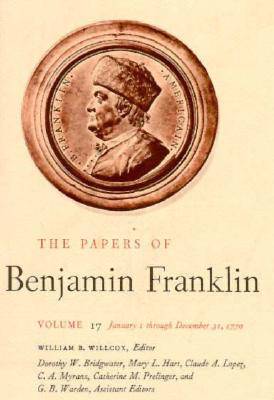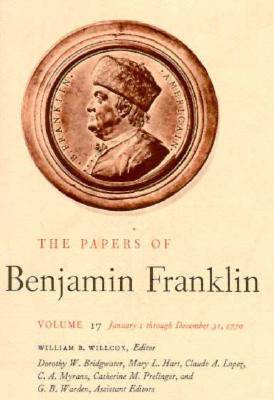
- Afhalen na 1 uur in een winkel met voorraad
- Gratis thuislevering in België vanaf € 30
- Ruim aanbod met 7 miljoen producten
- Afhalen na 1 uur in een winkel met voorraad
- Gratis thuislevering in België vanaf € 30
- Ruim aanbod met 7 miljoen producten
Zoeken
The Papers of Benjamin Franklin, Vol. 17
Volume 17, January 1, 1770 Through December 31, 1770
Benjamin Franklin
€ 234,45
+ 468 punten
Omschrijving
The year 1770 was momentous on both sides of the Atlantic. In England, Lord North began his long and calamitous ministry by repealing all the Townsend duties except that on tea. This partial repeal eroded the basis of the nonimportation agreements and they quickly collapsed. Franklin lost his campaign in America to keep them in force, just as he lost his campaign in England to secure total repeal.
Perhaps these defeats forced Franklin to re-examine his position. In any case he became less an irenic pragmatist and more a radical. In Massachusetts, where political debate was at its hottest, he publicized for the first time his belief that Parliament did not have sovereignty over the empire. A few months later he was elected agent of the Massachusetts House of Representatives, and thereafter he was de facto spokesman for four of the thirteen colonies.
For that very reason he was open to attack. In Boston he was suspect as a royal official and the father of a colonial governor. In England he was vilified as an unfaithful servant of the crown, and his position in the post Office was endangered. But he continued on his course, unrepentant, and in the privacy of his study he resumed his habit of writing lengthy marginalia on the pamphlets he was reading. These comments are the nearest we can come to listening to the man in conversation.
Perhaps these defeats forced Franklin to re-examine his position. In any case he became less an irenic pragmatist and more a radical. In Massachusetts, where political debate was at its hottest, he publicized for the first time his belief that Parliament did not have sovereignty over the empire. A few months later he was elected agent of the Massachusetts House of Representatives, and thereafter he was de facto spokesman for four of the thirteen colonies.
For that very reason he was open to attack. In Boston he was suspect as a royal official and the father of a colonial governor. In England he was vilified as an unfaithful servant of the crown, and his position in the post Office was endangered. But he continued on his course, unrepentant, and in the privacy of his study he resumed his habit of writing lengthy marginalia on the pamphlets he was reading. These comments are the nearest we can come to listening to the man in conversation.
Specificaties
Betrokkenen
- Auteur(s):
- Uitgeverij:
Inhoud
- Aantal bladzijden:
- 402
- Taal:
- Engels
- Reeks:
- Reeksnummer:
- nr. 17
Eigenschappen
- Productcode (EAN):
- 9780300015966
- Verschijningsdatum:
- 10/09/1973
- Uitvoering:
- Hardcover
- Formaat:
- Genaaid
- Afmetingen:
- 155 mm x 227 mm
- Gewicht:
- 907 g

Alleen bij Standaard Boekhandel
+ 468 punten op je klantenkaart van Standaard Boekhandel
Beoordelingen
We publiceren alleen reviews die voldoen aan de voorwaarden voor reviews. Bekijk onze voorwaarden voor reviews.








